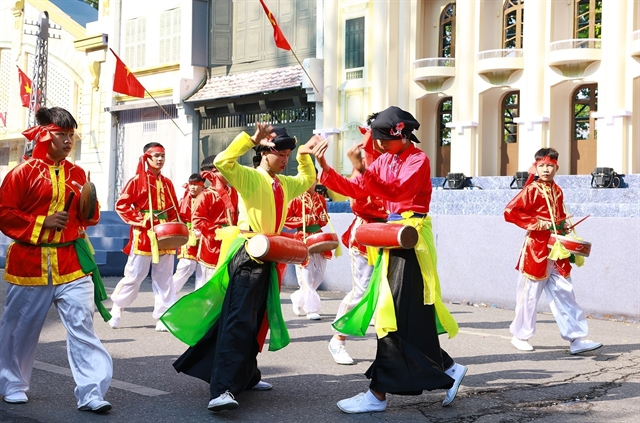Hà Nội would be a great host for City of Heritage Festival
Culture - Ngày đăng : 08:54, 16/10/2024
 |
| Director Hồ Công Cường. Photo hanoimoi.vn |
Hà Nội has rich cultural resources and favourable conditions in terms of its location and attractive creative art spaces, a perfect place to become a festival city contributing to the development of the cultural industry.
Hà Nội Mới (New Hà Nội) reporter Hoàng Lân interviewed director Hoàng Công Cường about creating a festival.
Cường directed the Cultural Festival for Peace on October 6 at the King Lý Thái Tổ Monument to mark the 70th anniversary of the city being liberated from French occupation, and the 25th anniversary of Hà Nội's recognition as City for Peace by UNESCO.
The Cultural Festival for Peace featured hundreds of tangible and intangible heritages with participation of more than 8,000 people in parades and folk art performances. What do you think about organising large festivals in Hà Nội?
The festival involved thousands of performers in parades and performances taking place in Hoàn Kiếm (Sword Return) Lake. The pedestrian area around the lake was a main stage.
This is not the first time Hà Nội has held a large cultural festival. The capital has organised many large-scale events. Recently I was director of the opening and closing ceremonies of the 31st Southeast Asian Games.
However, staging a large-scale programme with thousands of participants at a stadium is very different from organising a performance on an outdoor stage like Hoàn Kiếm Lake.
I think that the lake is a wonderful location and perfect for organising important events and cultural festivals.
Hà Nội has the largest number of tangible and intangible heritages and traditional festivals in the country. In your opinion, with this advantage, Hà Nội can become a heritage festival city?
Currently, many other provinces and cities have been building cultural tourism products, with those products exploiting the typical cultural potential of each location.
The central province of Thừa Thiên Huế has Huế Festival, the central city of Đà Nẵng has Firework Festival, the coastal southern province of Khánh Hòa has a Light Festival and Sea Festival, and Đà Lạt in the Central Highlands province of Lâm Đồng has Flower Festival.
Hà Nội Capital has cultural heritages recognised by UNESCO and the nation including Thăng Long Citadel, Gióng Festival, Temple of Literature, and others. So Hà Nội has great potential to become a heritage festival city.
 |
| A folk dance is performed at the Cultural Festival for Peace in Hà Nội. VNA Photo Dương Giang |
Is it right that it is difficult for Hà Nội to build symbolic cultural festivals because it has multiple cultural heritages?
Hà Nội has cultural heritages, relic sites and festivals spreading evenly in localities and each locality has different ways of honouring heritage.
Gióng Festival worshiping Phù Đổng Thiên Vương or Saint Gióng, a legendary national hero who sacrificed his life to defeat foreign invaders, is held yearly in Sóc Temple in Sóc Sơn District and in Phù Đổng Temple in Gia Lâm District.
It shows that Hà Nội's cultural and historical heritages are diverse and each heritage has its own story associated with local customs and traditions.
I think that nothing is more attractive than telling stories about Hà Nội's culture and history through performing arts. It's just a matter of how to tell it vividly to attract a large audience and tourists.
In my opinion, Hà Nội should focus on making good use of its UNESCO and nation-recognised cultural heritages.
There will be interesting stories to tell to the tourists. For example, Long Biên Bridge and Thăng Long Citadel are stories about culture and history. Meanwhile, the Temple of Literature is a story about the tradition of fondness of study.
What would you do to promote Hà Nội as a destination for heritage festival?
As mentioned above, Hà Nội should have cultural products which will be held during the year in Thăng Long Citadel, Hoàn Kiếm Lake or on the banks of the Red River. These locations are suitable for cultural and art activities.
In addition, it needs to have appropriate mechanisms and policies to promote cooperation and investment from businesses and State-owned sectors for cultural development.
State management plays an important role in popularising these events. It is also necessary to have policies for tourism activities to combine festival programmes into tour products, something many countries are doing very well.
It is necessary to have a planning strategy and effective investment to turn cultural potential into a driving force for economic development. VNS
